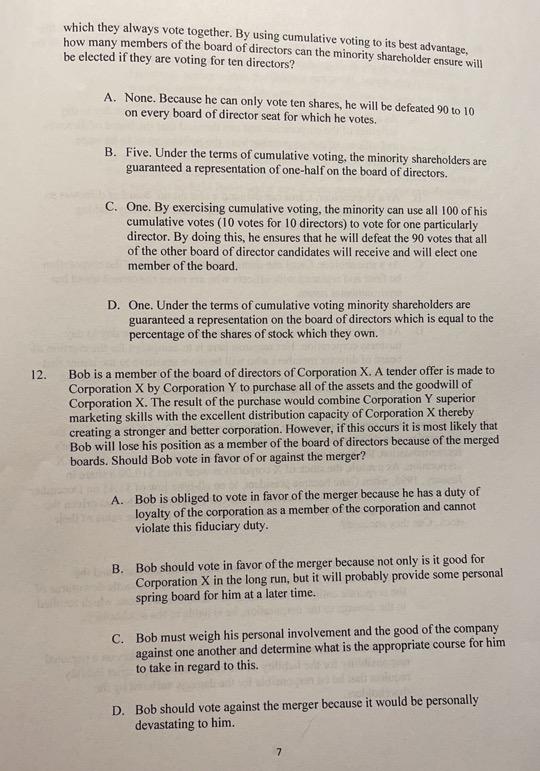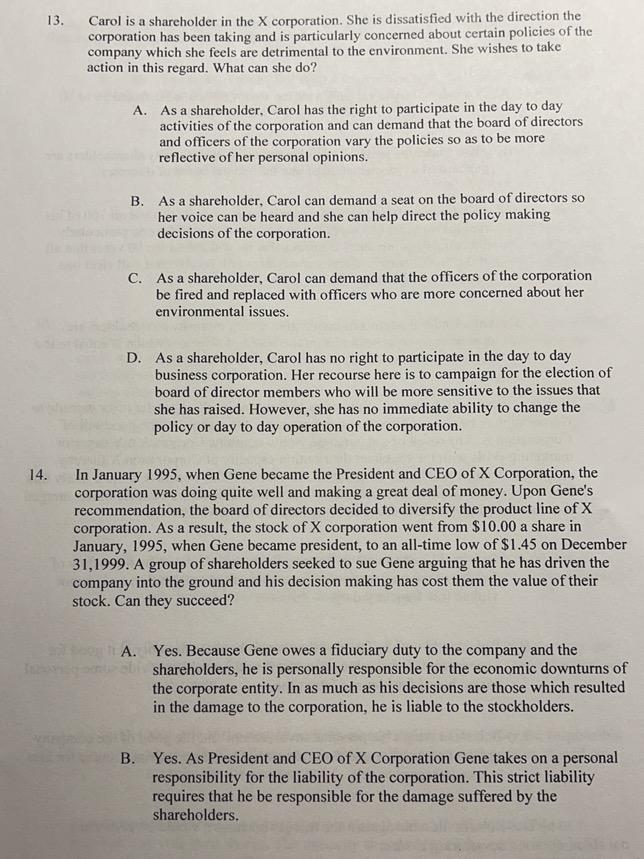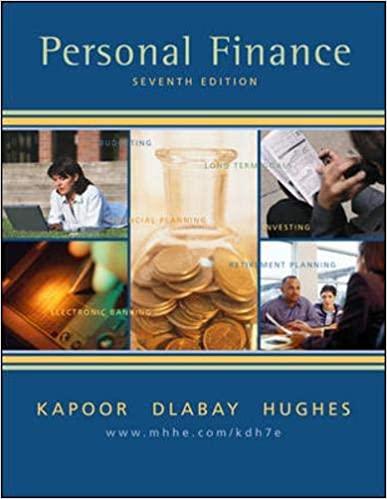

which they always vote together. By using cumulative voting to its best advantage, how many members of the board of directors can the minority shareholder ensure will be elected if they are voting for ten directors? A. None. Because he can only vote ten shares, he will be defeated 90 to 10 on every board of director seat for which he votes. B. Five. Under the terms of cumulative voting, the minority shareholders are guaranteed a representation of one-half on the board of directors. C. One. By exercising cumulative voting, the minority can use all 100 of his cumulative votes ( 10 votes for 10 directors) to vote for one particularly director. By doing this, he ensures that he will defeat the 90 votes that all of the other board of director candidates will receive and will elect one member of the board. D. One. Under the terms of cumulative voting minority shareholders are guaranteed a representation on the board of directors which is equal to the percentage of the shares of stock which they own. Bob is a member of the board of directors of Corporation X. A tender offer is made to Corporation X by Corporation Y to purchase all of the assets and the goodwill of Corporation X. The result of the purchase would combine Corporation Y superior marketing skills with the excellent distribution capacity of Corporation X thereby creating a stronger and better corporation. However, if this occurs it is most likely that Bob will lose his position as a member of the board of directors because of the merged boards. Should Bob vote in favor of or against the merger? A. Bob is obliged to vote in favor of the merger because he has a duty of loyalty of the corporation as a member of the corporation and cannot violate this fiduciary duty. B. Bob should vote in favor of the merger because not only is it good for Corporation X in the long run, but it will probably provide some personal spring board for him at a later time. C. Bob must weigh his personal involvement and the good of the company against one another and determine what is the appropriate course for him to take in regard to this. D. Bob should vote against the merger because it would be personally devastating to him. 13. Carol is a shareholder in the X corporation. She is dissatisfied with the direction the corporation has been taking and is particularly concerned about certain policies of the company which she feels are detrimental to the environment. She wishes to take action in this regard. What can she do? A. As a shareholder, Carol has the right to participate in the day to day activities of the corporation and can demand that the board of directors and officers of the corporation vary the policies so as to be more reflective of her personal opinions. B. As a shareholder, Carol can demand a seat on the board of directors so her voice can be heard and she can help direct the policy making decisions of the corporation. C. As a shareholder, Carol can demand that the officers of the corporation be fired and replaced with officers who are more concerned about her environmental issues. D. As a shareholder, Carol has no right to participate in the day to day business corporation. Her recourse here is to campaign for the election of board of director members who will be more sensitive to the issues that she has raised. However, she has no immediate ability to change the policy or day to day operation of the corporation. 4. In January 1995, when Gene became the President and CEO of X Corporation, the corporation was doing quite well and making a great deal of money. Upon Gene's recommendation, the board of directors decided to diversify the product line of X corporation. As a result, the stock of X corporation went from $10.00 a share in January, 1995, when Gene became president, to an all-time low of $1.45 on December 31,1999 . A group of shareholders seeked to sue Gene arguing that he has driven the company into the ground and his decision making has cost them the value of their stock. Can they succeed? A. Yes. Because Gene owes a fiduciary duty to the company and the shareholders, he is personally responsible for the economic downturns of the corporate entity. In as much as his decisions are those which resulted in the damage to the corporation, he is liable to the stockholders. B. Yes. As President and CEO of X Corporation Gene takes on a personal responsibility for the liability of the corporation. This strict liability requires that he be responsible for the damage suffered by the shareholders. which they always vote together. By using cumulative voting to its best advantage, how many members of the board of directors can the minority shareholder ensure will be elected if they are voting for ten directors? A. None. Because he can only vote ten shares, he will be defeated 90 to 10 on every board of director seat for which he votes. B. Five. Under the terms of cumulative voting, the minority shareholders are guaranteed a representation of one-half on the board of directors. C. One. By exercising cumulative voting, the minority can use all 100 of his cumulative votes ( 10 votes for 10 directors) to vote for one particularly director. By doing this, he ensures that he will defeat the 90 votes that all of the other board of director candidates will receive and will elect one member of the board. D. One. Under the terms of cumulative voting minority shareholders are guaranteed a representation on the board of directors which is equal to the percentage of the shares of stock which they own. Bob is a member of the board of directors of Corporation X. A tender offer is made to Corporation X by Corporation Y to purchase all of the assets and the goodwill of Corporation X. The result of the purchase would combine Corporation Y superior marketing skills with the excellent distribution capacity of Corporation X thereby creating a stronger and better corporation. However, if this occurs it is most likely that Bob will lose his position as a member of the board of directors because of the merged boards. Should Bob vote in favor of or against the merger? A. Bob is obliged to vote in favor of the merger because he has a duty of loyalty of the corporation as a member of the corporation and cannot violate this fiduciary duty. B. Bob should vote in favor of the merger because not only is it good for Corporation X in the long run, but it will probably provide some personal spring board for him at a later time. C. Bob must weigh his personal involvement and the good of the company against one another and determine what is the appropriate course for him to take in regard to this. D. Bob should vote against the merger because it would be personally devastating to him. 13. Carol is a shareholder in the X corporation. She is dissatisfied with the direction the corporation has been taking and is particularly concerned about certain policies of the company which she feels are detrimental to the environment. She wishes to take action in this regard. What can she do? A. As a shareholder, Carol has the right to participate in the day to day activities of the corporation and can demand that the board of directors and officers of the corporation vary the policies so as to be more reflective of her personal opinions. B. As a shareholder, Carol can demand a seat on the board of directors so her voice can be heard and she can help direct the policy making decisions of the corporation. C. As a shareholder, Carol can demand that the officers of the corporation be fired and replaced with officers who are more concerned about her environmental issues. D. As a shareholder, Carol has no right to participate in the day to day business corporation. Her recourse here is to campaign for the election of board of director members who will be more sensitive to the issues that she has raised. However, she has no immediate ability to change the policy or day to day operation of the corporation. 4. In January 1995, when Gene became the President and CEO of X Corporation, the corporation was doing quite well and making a great deal of money. Upon Gene's recommendation, the board of directors decided to diversify the product line of X corporation. As a result, the stock of X corporation went from $10.00 a share in January, 1995, when Gene became president, to an all-time low of $1.45 on December 31,1999 . A group of shareholders seeked to sue Gene arguing that he has driven the company into the ground and his decision making has cost them the value of their stock. Can they succeed? A. Yes. Because Gene owes a fiduciary duty to the company and the shareholders, he is personally responsible for the economic downturns of the corporate entity. In as much as his decisions are those which resulted in the damage to the corporation, he is liable to the stockholders. B. Yes. As President and CEO of X Corporation Gene takes on a personal responsibility for the liability of the corporation. This strict liability requires that he be responsible for the damage suffered by the shareholders








